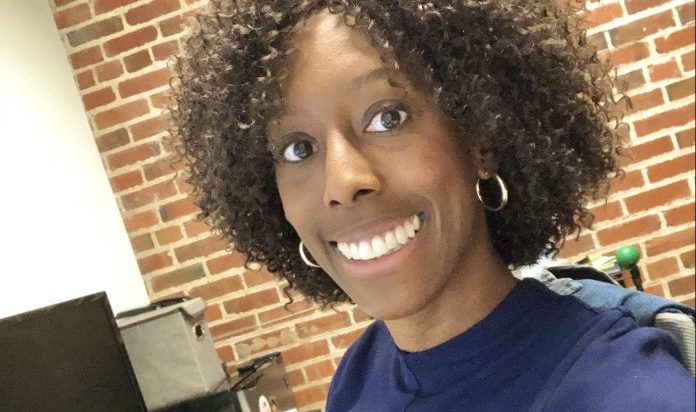Determination, Diversity & Representation: 5 Ways Sonia Castellano Prioritized Her Passions in the Boot Camp and Beyond

Sonia Castellano’s journey into technology began on Facebook. An active networker, she was struck when she came across a connection’s testimonial about a coding boot camp they had attended. She raved about the experience, reflecting on how she went from a dead-end job to a career that doubled her income and changed her life. Then, Sonia was the member services manager of a fitness studio with a passion for website development — and she was ready for a change.
“It was so powerful to see this post come from a Black woman like myself — I don’t have to tell you that representation in tech is low for women, and specifically women of color,” said Sonia. “It’s unfortunate that diversity still isn’t the norm in tech roles. This woman, my friend, was successfully challenging that.”
Sonia made the decision to enroll in University of Denver Coding Boot Camp, passing the entrance exam with flying colors. “I realized, I’m good at this,” said Sonia. Due to the timing of COVID-19 stay-at-home orders, Sonia’s boot camp experience and subsequent job search were moved entirely online. She dove in completely — forging connections, gaining confidence, honing skills, and eventually, landing a role at a company that shares her values and honors her voice.
Ultimately, the boot camp empowered Sonia throughout her career search. Here’s what she learned.
1. Learn how to believe in yourself all over again.
For Sonia, the process of enrolling in the boot camp meant entering a space where she knew she wasn’t going to see people who looked like her.
“I spoke to a lot of students and alumni who said they dealt with imposter syndrome,” she said. “I definitely felt that. We hear so much about the ‘typical’ person in tech — who software developers are and who they should be — and I didn’t fit into any of that. Succeeding was a process of learning all over again how to believe in myself, of leveling up and measuring myself up against my own yardstick.”
2. Treat interviews as a two-way street.
As Sonia described what it was like starting her job search amidst the boot camp, she recalled a lot of students expressing that they just wanted to get hired — that they didn’t care where they worked, that they’d take any role they were offered, and that the goal was simply to get any job.
“My approach could not have been more different than that,” said Sonia. “Throughout the application and interviewing process, I was sure to always keep in mind that I was interviewing the company as much as they were interviewing me. At the end of the day, that’s what allows you to be satisfied with the people you work with and the organization you work for.”
3. Establish your non-negotiables — and do your research.
Sonia’s vetting didn’t begin at the start of the interview. She did a lot of behind the scenes work to ensure that every company she applied to reflected her values. She looked up each of their mission statements, searched through their social media accounts, and examined how they were responding to current events and everything that’s happening in the country’s social and political arenas.
“My cohort completed the boot camp in the first week of June,” she said. “It coincided with the protests happening across America. I knew I wanted to see something that reflected a keen awareness of the current time. And that’s not to say that I needed to work at a company that had Black Lives Matter signs hanging on every wall, but I did want to make sure that there was a clear thought process and energy going into diversity work on the team that I was going to join.”
4. Hone in on the right fit for you — and get to work.
After an intense and focused three-week job search, Sonia landed in her new position at InPlace Software Inc., a division of Quantum IT Australia. She uses the skills she worked hard to master in the boot camp every day — from SQL, data analysis and knowing how to think on her feet to navigating remote work after an entirely virtual boot camp experience. But it’s not all technology-based. The internal work she did — learning to believe in herself and prioritizing her values in her ultimate decision — were undeniable factors in her success and fulfillment.
“It’s been phenomenal,” said Sonia. “Part of what drew me to the company was that early on, I saw they had publicly posted literature communicating where they stood in support of Black Lives Matter, civil rights, social rights, and human rights. I knew those were things that mattered to me — and it paid off to follow that drive instead of giving into that desperation for just any job. Now, here I am, currently the only Black woman in the tech department of my company’s U.S. office, working with predominantly white males, but I don’t feel demeaned, disrespected, or slighted. I feel like my voice matters in every conversation. And that feels good.”
5. Look to the future and what it can hold.
For Sonia, discussing her lack of representation in tech — and how it fits into the current movement — isn’t about having a perfect answer. It’s about starting the conversation.
“It’s not an easy subject to talk about, but it’s necessary,” said Sonia. “Being able to discuss these things — to enjoy the people that I work with, to be part of such a close-knit team, and to make landing this job a win-win for both myself and the organization has been fantastic. It’s tough, and it’s challenging, but it’s amazing. For anyone who is considering following a similar path: do it. Take a bet on yourself. It won’t be easy, but it’s worth it.

 Live Chat
Live Chat